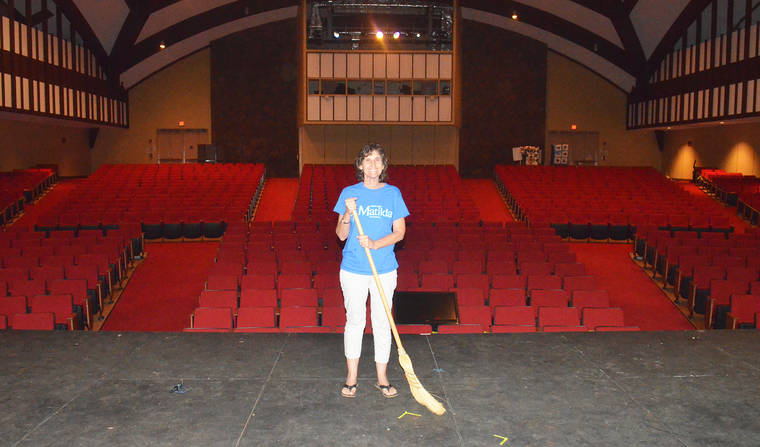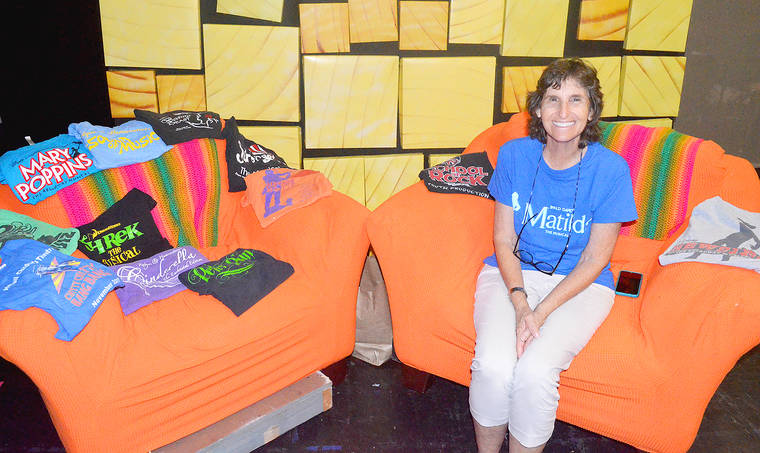Debra Blachowiak can name every fall show she has produced with Hawaii Children’s Theatre since 1997.
She starts to list them: “Oliver,” “The King and I,” “A Christmas Carol,” “Peter Pan,” “Honk!” and “Alice In Wonderland.”
“Big River is in there,” she says. “And Beauty and the Beast.”
And “Mary Poppins” and “Shrek” and “School of Rock” and “Cinderella” and “Fiddler on the Roof” and “The Sound of Music,” and “Newsies,” and most recently, “Matilda.”
Some, they did more than once.
There’s a story to each of them for Blachowiak. Take Fiddler on the Roof, for example.
“That was my maternal grandmother’s story,” she said. “They lived in Lithuania and were Jewish. Right around the early 1906 or 07, I think it was, the Russian military people came into their village and said, ‘Be gone by tomorrow, or else.’ They left everything and traveled to Cleveland. It was a story of many, many, many people and that’s the story Fiddler on the Roof, as well.”
So many productions. So many sold-out shows. So many fine performances. So much applause. So many roles and lines and directors and choreographers.
Blachowiak, always youthful, cheerful, smiling, was there.
She got involved when she took her daughter Julie to see HCT’s production of “Charlotte’s Web.” Her daughter, 4 years old at the time, was fascinated with the performance and wanted to be on stage. Mom said OK, she could join HCT, and she soon found herself doing more than watching her daughter act. She became the producer.
But after 22 years of being the person responsible for close to everything — while never getting paid a penny, Debra Blachowiak is stepping down from the post that has brought her so much joy and laughter and memories.
She will remain on HCT’s board.
“I’m not going to miss anything because I will be involved,” she says. “I’ll be happy to be involved on a lesser scale.”
It’s just time to try something new, she says. The college biology major wants to spend more time seeing what she can do to help on environmental issues that have risen in importance over the years, especially on Kauai, her longtime home and a place that is near and dear to her heart.
She likes to joke that her primary job at HCT for more than two decades has been sweeping up every night after everyone leaves. Now, it’s true that she does, indeed, grab a broom and sweeps the stage, the dressing rooms and anywhere else there is dirt, but that’s far from her key role.
For that, consider managing the budget, paying the bills, being part of the team to select each production, settling on a director and being there pretty much every night to be sure things are where they are supposed to be and people are doing what they are supposed to be doing.
It’s all in a day’s work for Blachowiak. And she doesn’t exactly get rich for it.
“I don’t get pay,” she said, laughing.
No problem.
It’s not about money for this real estate agent with more than 40 years of experience. It’s more about just being there for the keiki and giving them an opportunity to be in the spotlight, to grow and perhaps to do far more with their singing voices and acting skills than they imagined.
“I’ve watched kids that are super shy, introverted, worried, just blossom in this particular endeavor,” she said. “That’s always wonderful.”
So how did your daughter joining HCT lead you to being named producer?
I had to be around. Her first play was “The Lion, the Witch and the Wardrobe.” That was at Island School. She had one line, I think, at the end. She was five. She said her line, got applause and she was hooked. Then came “Oliver.”
Did you have producing experience?
I didn’t even know I was a producer back then. I was just doing everything. Bobbi Downs was the director. I just grew into this. The next year, I thought about it and got more efficient. Julie was in most of the plays until she was 13 or 14. I think “Big River” was her last one.
What about an acting background?
No. I had never been on stage. I didn’t know anything about anything. I’m a biology major. I also don’t know anything about real estate when I started and I’ve been doing that for 40 years now.
What does a producer do?
We decide as a group what play we’re going to do. Then we have to get the rights. We set the budget so we know we can afford to do it. We hire the staff. Then we need to secure the space, then we have to have auditions, then it really gets busy when we start rehearsal.
So, you’re involved, start to finish?
I’m the last one out of the lobby every night. I’m sweeping up, I’m doing all of that. I’m making sure they dump the dumpster. There’s a lot of garbage involved. There’s a lot to do with the set. A lot of people are volunteers.
Once the cast is picked and you start rehearsals, how much time do you put in?
I would say, the first month maybe 10 hours a week. the second month, maybe 15 hours a week, and the last two weeks, just constant. Through the rest of the show, it’s a lot.
What kind of budgets do you work with?
This show (“Matilda”) the budget is $70,000. Ten percent of that is the rights. Matilda is a Tony Award-winning show. We have all of these expenses, then keeping our organization going. We have to put in five months worth of the cost, our rent at Puhi Theatrical Warehouse,we have one part-time employee, insurance, electricity, all of that. We have to pay the director, the tech director, the music director.
But you don’t get paid?
No, I don’t get paid. And the actors don’t get paid. We’re what is called a non-equity theater because the actors are not paid.
So why did you decide to stop producing HCT plays?
It’s a lot of work. I’m lifting things. I guess I don’t want to push it. The other reason is, I have a real deep love for environmental issues and I want to start giving some energy to that. But I’m going to stay on the board of HCT. I’m just not going to be in charge of producing any shows.
Will you be offering help to the next producer?
I’m writing a ‘how-to’ manual’ for them. It’s going to be thick (laughs).
What’s been the best part of being producer with HCT?
Watching the kids develop over the years and go off and do great things. One of the kids, Siena Augudong, she’s like in the movies now. She’s doing great. The best part is just watching the kids. I like to say, and I say this to the parents in orientation, a production like this, it’s like a team sport where you win every game, basically. It’s the self-confidence that comes along to the kids. Maybe they’re not athletic, maybe they’re more artistic.
Why do you think HCT has such a strong following?
It’s a unique program. There’s really nothing like it in the rest of Hawaii. And a lot of it goes to Bobbie Downs, who started it. She was the producer and initial director. She did the hair and the makeup in this show (Matilda).
Any final thoughts about your final show, Matilda?
I’m just so pleased at how great it is. We just got so lucky with the casting, finding the children that could do British accents.
What is your hope with each performance?
We try and be really authentic. We just try and give the community a taste of what it’s like to see amazing Broadway plays, because if a play makes it on Broadway, it’s a good play.




Very nice article!
Awesome job Deb. I know you will be missed…the plays that I was fortunate enough to see were always top caliber. I know your skills and dedication will be missed!
Bravo, Debra.
You are a star, even if you never once appeared on stage during a performance.
Mahalo for the fine work you have done, and contributed to our community!